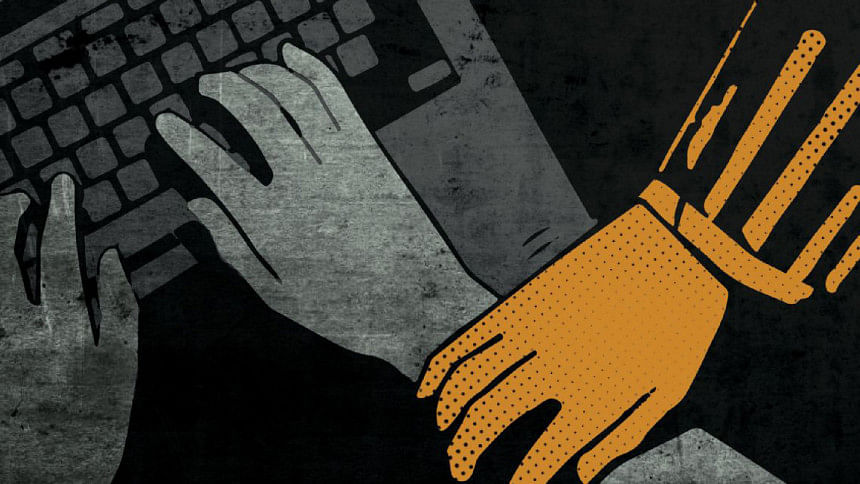A dive into the laws affecting media freedom

Recent events, including the arrest of Prothom Alo journalist Samsuzzaman Shams and the filing of a case against Matiur Rahman, the editor of Prothom Alo, have highlighted the challenges and risks journalists in Bangladesh face while carrying out their work. It also underscores the urgent need to examine the country's press laws and their impact on media professionals. Despite the country's constitutional guarantees of press freedom, there has been a range of tactics to limit media independence in the country. The implementation of the legal framework governing the media in Bangladesh has been largely ineffective, and the media is frequently subject to government or political pressure.
Constitution of Bangladesh
Article 39 guarantees the freedom of speech and expression, including the freedom of the press, as a fundamental right of citizens. However, Article 39(2) allows for reasonable limits to be imposed on this right in the interests of protecting national security, friendly relations with foreign states, public order, decency or morality, or in relation to contempt of court, defamation or incitement to an offence.
Digital Security Act 2018
Several provisions of the DSA penalise a number of online content category on grounds of defamation, disinformation, propaganda or campaign against the spirit of liberation war, propaganda or campaign against the father of the nation, tarnishing the reputation of the state, incitement of offence or communal disharmony and hurting religious sentiments. However, the broad wording of the provisions allow the government to leverage the vagueness to vilify political opponents. Section 8 provides the authorities with sweeping powers to block or remove any digital content deemed harmful. The Act further allows search, seizure and arrest without warrant under section 43 on mere suspicion of a crime committed using the digital medium.
Right to Information Act, 2009
Although designed to ensure the unrestricted flow of information to provide both public and private organisations with greater clarity, transparency, and accountability; certain government and legal entities, such as DGFI, NSI, and CID, are excluded from this Act pursuant to section 32. Further, certain categories of information are exempt from mandatory disclosure under section 7, such as those that could potentially jeopardise national integrity or foreign alliances.
Information and Communication Technology (ICT) Act, 2006
While the controversial provision of section 57 has been abolished by the Digital Security Act, the government is still able to intercept digital communication under section 46 on the basis of considerations related to national integrity, public order, and diplomatic relations.
Press Council Act, 1974
It establishes the Press Council under section 3 to supervise, and improve the press in Bangladesh by holding, and disposing of information as well as by providing a code of conduct for newspapers and journalists to follow.
Printing Presses and Publications (Declaration and Registration) Act, 1973
Sections 3-23 of the Act provide regulations relating to the printing, publication and authorisation of newspapers and news sheets, such as the preservation of trademarks and names, maintaining publication and printing standards and the involvement of editors and writers.
Official Secrets Act, 1923
Designed to regulate and improve official confidentiality and secrecy, section 5 of the Act prohibits any person, who possesses or controls secret or classified information, such as sketches, plans, or articles, under official or government authority, from sharing it with others, including the media. Such prohibition greatly limits media access to important information, as the government can easily classify information as confidential and restrict its dissemination.
Code of Criminal Procedure, 1898
Section 99A of the Code provides power to the government to declare newspaper publications forfeited and to issue search warrants for the same if it contains defamatory content against the President, Prime Minister, Speaker of Parliament or the Chief Justice of Bangladesh. Section 99G makes any order or action taken under this provision be deemed final and not be subject to review by any court except through the prescribed mechanism provided in section 99B.
Penal Code, 1860
Section 499 penalises defamation and this provision is often misused to curtail the freedom of expression and press, ultimately forcing many journalists to undergo self-censorship.
The writer is an Official Contributor, Law Desk, The Daily Star

 For all latest news, follow The Daily Star's Google News channel.
For all latest news, follow The Daily Star's Google News channel. 



Comments